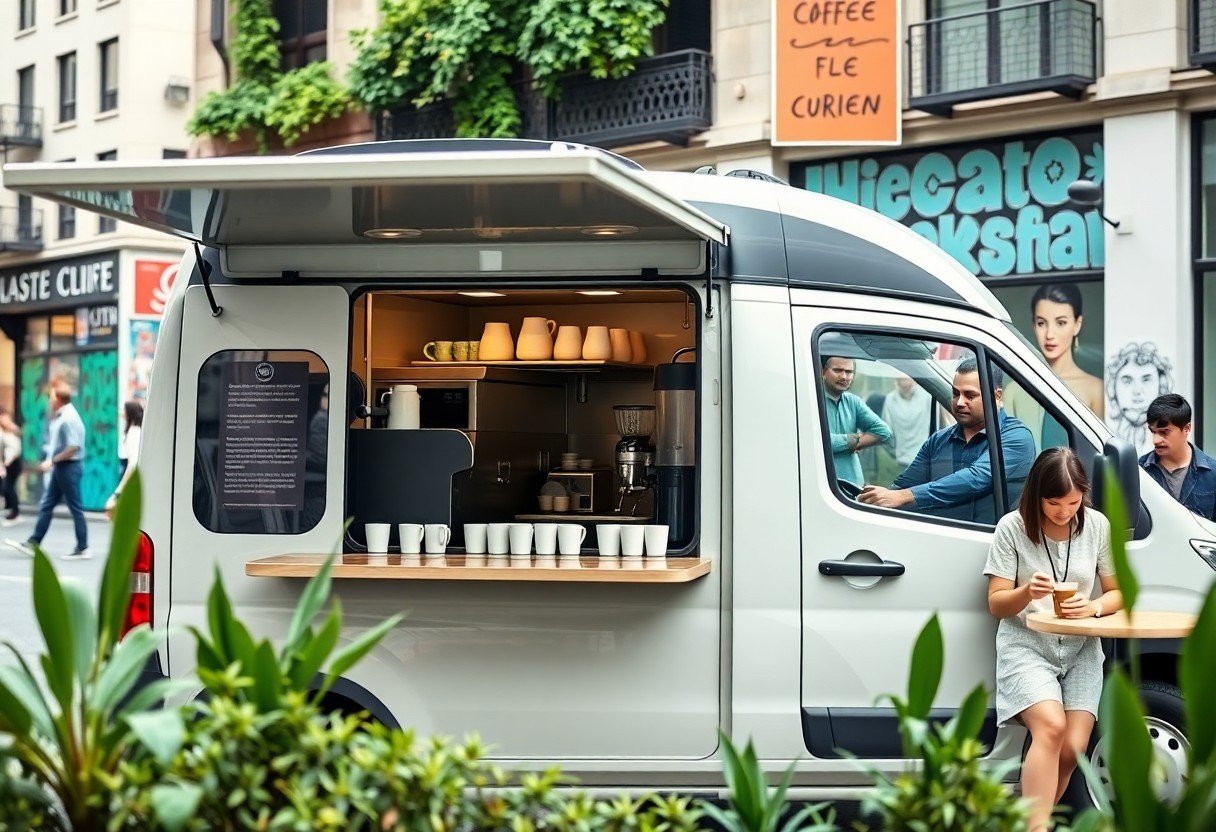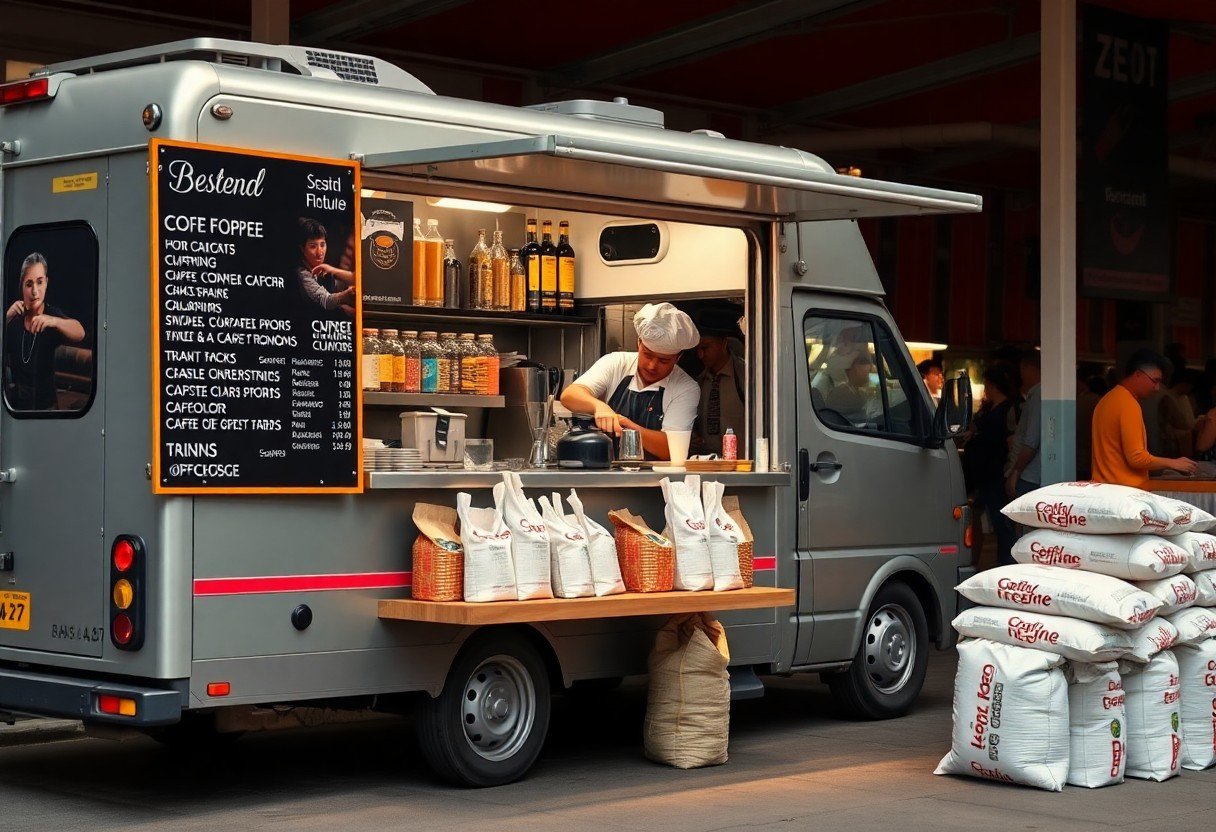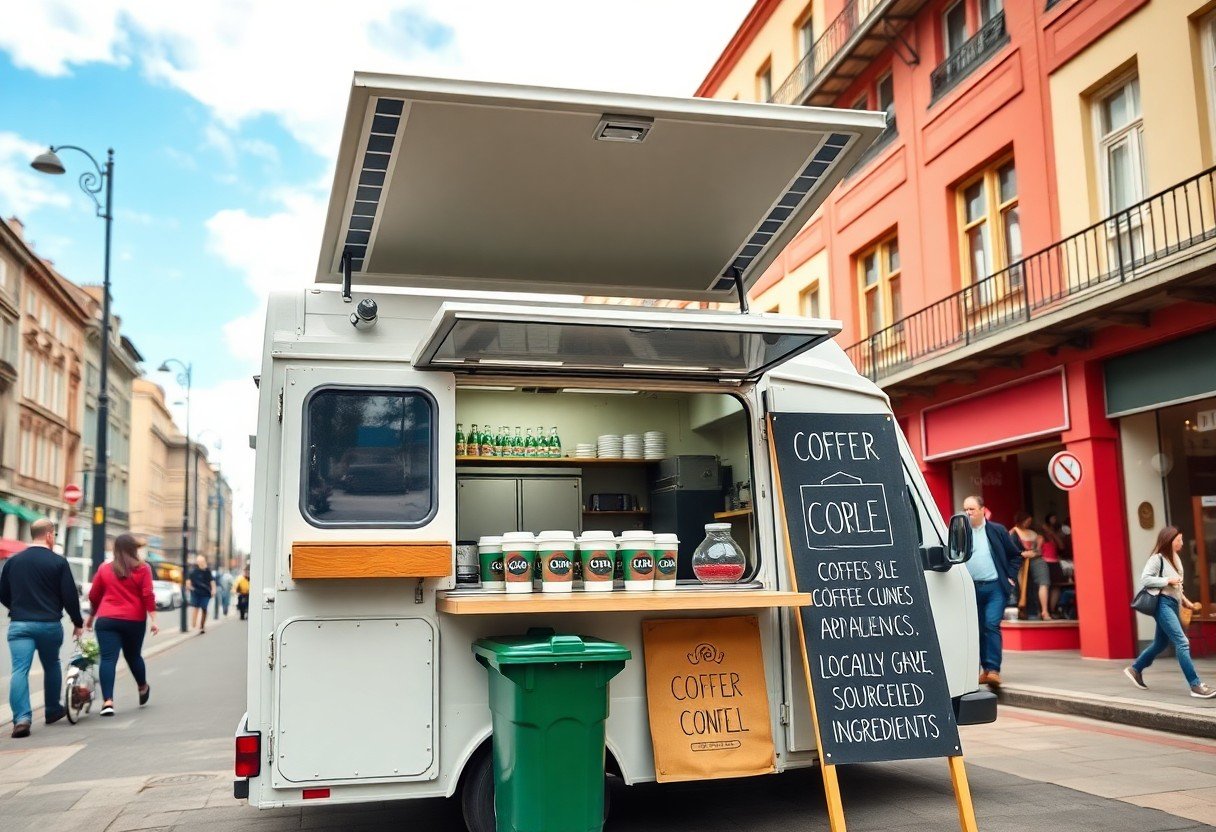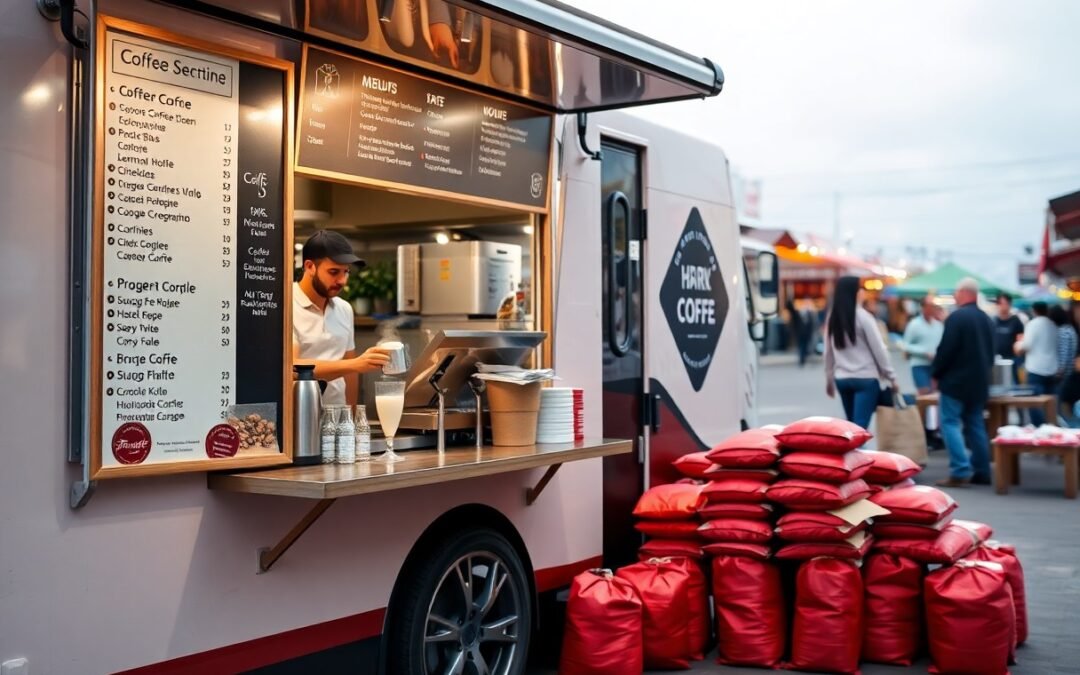With the rise of coffee culture and the growing demand for convenient beverage options, owning a mobile coffee van can be an exciting venture. You have the opportunity to reach diverse customers while enjoying the freedom of mobility. However, along with the potential for profit and personal satisfaction, you must also navigate challenges like maintenance costs and regulatory compliance. This post will explore both the advantages and disadvantages, helping you make an informed decision about whether this business model is right for you.
The Financial Landscape of Mobile Coffee Vans
Initial Investment: Costs and Considerations
Starting a mobile coffee van requires a significant upfront investment. Costs can include the purchase of the van itself, which may range from $15,000 to $100,000 depending on its condition and customization. You also need to factor in equipment such as espresso machines, grinders, and blenders, which can cost an additional $10,000 to $25,000. Beyond equipment, licensing, permits, insurance, and initial inventory of coffee beans and supplies add further to your initial costs. You should also consider potential renovation costs if you’re modifying a van to suit your needs.
Budgeting for startup marketing expenses is necessary as well, promoting your brand through social media, local events, or partnerships can help you attract customers from day one. Setting aside capital for unexpected repairs or additional marketing can help ensure your business remains solvent during its initial months. Developing a comprehensive financial plan that includes all these factors will be key in determining your break-even point and long-term profitability.
Potential Revenue Streams: Maximizing Profitability
Beyond selling coffee, you can diversify your income by offering complementary products like pastries, snacks, or merchandise, increasing each customer’s average spend. Participating in festivals, farmers’ markets, or corporate events not only expands your customer base but also allows for higher volume sales than a stationary shop may provide. You may also explore implement subscription services through pre-paid coffee plans, which can create a steady income stream and encourage customer loyalty.
Being strategic in your pricing can also enhance profitability. For instance, a well-crafted signature drink can be marketed at a premium price, creating perceived value. Additionally, catering services for private events or office coffee deliveries can establish stronger community ties while significantly boosting your revenue. Analyzing sales data and customer preferences allows you to adjust your offerings and optimize profitability effectively.
Navigating Regulations and Licenses
Local Health and Safety Requirements
Complying with local health and safety regulations is a non-negotiable aspect of running your mobile coffee van. Your operation must adhere to food safety standards, which often include regulations around food storage, preparation, and sanitation. For example, you may need to implement specific measures for maintaining temperatures of perishables and ensuring that all equipment is regularly cleaned and serviced. Inspectors may conduct routine checks, and obtaining a passing grade can keep your business running smoothly.
Additionally, you might need training certifications for food handling. Courses like ServSafe provide imperative knowledge on managing allergies, contamination, and proper food hygiene. Failing to meet health and safety requirements can result in fines or the revocation of your operating permit, making these regulations a fundamental area to focus on from day one.
Navigating Permits and Business Licenses
Your mobile coffee van will require multiple permits and licenses, differing based on local government regulations. A business license is typically your first step, which establishes your right to operate within your chosen locality. In many regions, you may also need a mobile vendor permit, which specifies where and when you can set up shop. These permits help regulate the flow of businesses and ensure that your coffee van does not infringe upon established businesses or create safety hazards.
In addition to permits, specific health department licenses might be necessary. These licenses ensure that you meet safety and hygiene standards suitable for food and beverage sales. Closely consult your local government and health department, as they can provide detailed guidance tailored to your mobile operation’s unique requirements. The nuances in laws mean that what applies to one city may not apply to another, so thorough research is imperative to avoid compliance issues.

Crafting the Perfect Customer Experience
The Importance of Quality Products and Service
Your mobile coffee van must deliver exceptional beverages and service to stand out in a crowded market. Quality beans are non-negotiable; sourcing from reputable suppliers not only ensures a great taste but also reinforces your brand’s commitment to excellence. Consider investing in specialty coffee certifications or partnering with local roasters to provide unique blends that resonate with discerning customers. Consistency is key, so perfecting your brewing methods will lead to repeat visits and positive word of mouth.
Engaging with the Community: Building Loyal Customers

Operational Challenges Unique to Mobile Coffee Businesses
Logistics and Supply Chain Management
Effective logistics is central to the success of a mobile coffee van. You must establish reliable supply chain partnerships to ensure a consistent flow of high-quality coffee beans, equipment, and other imperative supplies. Planning your inventory effectively means knowing which ingredients you need on hand at all times, balancing between keeping popular items available while avoiding overstocking items that may not sell as well. You’ll also need to account for the logistics of food safety regulations, especially when sourcing fresh milk and pastries, which can vary significantly depending on local health codes.
Operational efficiency is critical during peak hours. Developing well-defined routes and schedules will optimize your service times and minimize downtime. Having a backup plan for unexpected equipment failures or supply shortages is imperative; you might consider partnering with a local roaster who can provide quick replacements or diversifying your product offerings to adapt to what’s available at any given moment. This proactive approach minimizes potential disruptions in your mobile coffee operations.
Handling Seasonal Fluctuations
Seasonal fluctuations can significantly impact demand patterns for your mobile coffee business. In warmer months, iced beverages may see a surge in popularity, necessitating the need for additional supplies of ice and cold brew options. Conversely, colder months typically drive demand for hot drinks, requiring you to adjust your menu and stock accordingly. Understanding your local market and seasonal trends can provide insights into which products to promote during specific times of the year.
Implementing seasonal adaptations can involve creative marketing strategies or limited-time offerings to entice customers. For example, introducing pumpkin spice lattes in the fall or festive beverages during the winter holiday season can appeal to seasonal consumer preferences. Tracking sales data from previous years can help you anticipate demand and refine your offerings, ensuring you remain competitive throughout the year.

Sustainable Practices in the Mobile Coffee Industry
Eco-Friendly Practices: Reducing Waste
Implementing eco-friendly practices is crucial in the mobile coffee industry. You can reduce waste significantly by opting for biodegradable or compostable cups and utensils. For instance, some brands now offer cups made from plant-based materials that decompose within months instead of lingering in landfills for years. Additionally, setting up a robust recycling program can encourage customers to dispose of items responsibly and educates them about waste management. The impact of such initiatives can enhance your brand image and attract environmentally conscious consumers.
Another strategy involves minimizing food waste by offering customers the option to customize their orders. By allowing them to choose portion sizes or offering smaller sizes at better prices, you signal awareness of waste management. Additionally, forming partnerships with local composting facilities can ensure that organic waste is disposed of more sustainably. These small yet impactful steps can contribute to a greener business model in the mobile coffee sector.
Sourcing Ethical Products: Connecting with Conscious Consumers
Ethical sourcing of coffee beans and other products appeals to consumers who prioritize sustainability and fairness in their purchases. By knowing the origin of your coffee and ensuring it is sourced from fair-trade certified farms, you not only support farmers but also build trust with your customer base. For example, companies that partner directly with farmers can showcase the stories behind their products, creating a personal connection that resonates with consumers. When you share these narratives, customers feel more invested in their purchases.
Identifying and partnering with local, organic suppliers can further enhance your mobile coffee van’s appeal. Sourcing seasonal ingredients cultivates a sense of community and freshness that urban consumers increasingly seek. Offering a rotating selection of drinks or pastries made from locally sourced ingredients can elevate your menu and showcase your commitment to ethical practices. By aligning your operations with consumer values, you foster loyalty and turn your mobile coffee business into a hub for conscious consumers.
Conclusion
The decision to invest in a mobile coffee van comes with its own set of advantages and challenges. You have the opportunity to reach diverse clients at various locations, enabling you to build a unique brand presence and capitalize on local events. Additionally, operating a mobile coffee van allows you flexibility in your schedule and the potential for high-profit margins, especially if you source quality ingredients and build a loyal customer base.
However, you must also consider the downsides, such as initial startup costs, ongoing maintenance, and the need for a comprehensive understanding of local regulations. Weather unpredictability and competition from established cafes can also impact your business. Ultimately, weighing these pros and cons will help you make an informed decision about whether a mobile coffee van aligns with your entrepreneurial goals and lifestyle preferences.
FAQ
Q: What are the main advantages of owning a mobile coffee van?
A: The main advantages include flexibility in location, lower overhead costs compared to a fixed café, the ability to cater to events and festivals, a unique branding opportunity, and the ability to connect with customers in various settings.
Q: What startup costs should I expect when launching a mobile coffee van?
A: Startup costs typically include the price of the van, equipment like espresso machines and grinders, permits and licenses, initial inventory of coffee and supplies, branding materials, and potential vehicle modifications.
Q: What are some common challenges faced by mobile coffee van owners?
A: Common challenges include navigating local regulations, dealing with weather conditions, competition from established coffee shops, ensuring consistent supply of quality ingredients, and managing variable income levels based on location and events.
Q: How does mobility positively impact customer engagement?
A: Mobility allows owners to reach different communities, participate in local events, and provide convenience to customers. This can create a loyal following as customers appreciate the accessibility and personalized service.
Q: Are there any drawbacks to operating a mobile coffee van?
A: Drawbacks may include the need for regular vehicle maintenance, potential difficulties in finding profitable locations, limited space for equipment and supplies, variable weather affecting sales, and the challenge of establishing a consistent customer base.

